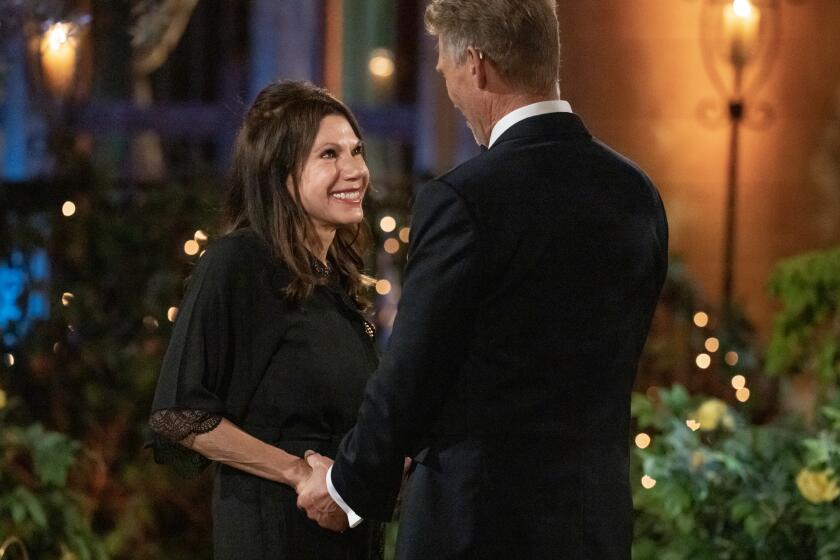High court may rethink @#*! on TV
The Supreme Court this week may reopen for the first time in more than 30 years the debate over what qualifies as an “indecent” broadcast.
The media environment has changed dramatically since 1978, when the court last ruled on this issue: Today’s viewers and listeners are exposed to the more freewheeling cable TV, Internet and “shock jocks” on satellite radio.
The issue before the court now is delicately described as the problem of “fleeting expletives” in over-the-air broadcasts, which are still regulated. TV viewers who watch the entertainment industry’s awards shows may be familiar with the phenomenon.
“This is really, really f---ing brilliant,” rock singer Bono exclaimed when accepting a 2003 Golden Globes Award for the best original song. His comment went live on NBC.
Upon receiving a Billboard Music Award for career achievement, Cher said the honor proved her critics wrong. “So f--- ‘em. I still have a job and they don’t,” the singer-actress said on Fox TV.
After receiving complaints from viewers, the Federal Communications Commission moved to crack down on broadcasters who air “isolated or fleeting expletives” during daytime and early evening hours.
Last year, Fox and the other networks sued to block the new policy, and an appeals court in New York put it on hold.
Now, the FCC is asking the high court to clear the way so the crackdown can be enforced. The justices may act on the agency’s appeal as soon as Monday. If they vote to hear FCC vs. Fox TV, arguments will be heard in the fall.
The appellate judges in New York said the new policy was arbitrary and vague. It does not, for example, say all expletives will trigger fines from the FCC regardless of the circumstances. News programs and movies such as “Saving Private Ryan” have been given exemptions. Including profanity from soldiers on the D-day beaches was not intended to shock or titillate, the FCC said, but help “convey the horrors of war.”
At the same time, the appellate judges hinted that a true ban on all broadcast expletives would violate the 1st Amendment’s free-speech guarantee.
With the agency handcuffed, U.S. Solicitor Gen. Paul D. Clement asked the Supreme Court to intervene and to revive the FCC’s new rule. Unless the high court acts, he said, the TV industry will have complete freedom to air expletives during the hours children and families typically are watching.
If the justices do take on this dispute, they will be obliged to ponder the many meanings of what the lawyers call the f-word and the s-word. Federal law does not provide much guidance. It forbids the broadcasting of “any obscene, indecent or profane language.” Congress has left it to the FCC to decide what that means.
In 1978, the court agreed with the FCC that comedian George Carlin’s “seven dirty words” monologue, when broadcast on the radio at midafternoon, was indecent. But the 5-4 decision in FCC vs. Pacifica Foundation was narrow. As one justice said, Carlin used words that “to most people are vulgar and offensive,” and he repeated them “over and over again as a sort of verbal shock treatment.”
Afterward, the FCC adopted this distinction. It described “indecency” as words or pictures that focus on “sexual or excretory organs” and which “dwell on or repeat at length” the descriptions. That rule seemed to leave a loophole for the occasional vulgar word that slipped into a broadcast.
The FCC changed course after it was flooded with complaints from grass-roots groups over vulgarities on entertainment awards shows. In March 2004, a month after an outcry over the brief exposure of Janet Jackson’s breast during the Super Bowl’s halftime show, the FCC commissioners adopted a near zero-tolerance policy for fleeting expletives. Their new rule said “any use of [the f-word] or a variation, in any context, inherently has a sexual connotation.”
FCC Chairman Kevin J. Martin said certain words were so offensive that children needed to be shielded from them on the public airwaves between 6 a.m. and 10 p.m.
“Can’t a television network wait until 10 p.m. to say [the f-word]?” asked Timothy Winter, president of the Parents Television Council, whose group has pressed for a crackdown on indecency. If the courts block the new rule from taking effect, “it absolutely would open the floodgates,” he said.
But broadcasters said they have no desire to air expletives, noting that they don’t allow them even after 10 p.m., when they are permitted under FCC rules. They’re simply trying to make sure that when an unscripted expletive is used -- most often by a celebrity who is not a network employee -- it does not result in a large fine.
Broadcasters have instituted five-second delays on awards shows and some other live programming, with employees poised to bleep out offensive language. But an occasional expletive slips through.
“It’s like the Maytag repairman,” said Rick Cotton, general counsel for NBC Universal. “You’re expecting that after sitting in front of a console for literally thousands of hours that at a particular moment, on a completely unexpected basis, a person will hear it and will react in time.”
The stakes have increased dramatically for broadcasters found guilty of airing an indecency. Congress voted in 2006 to boost the maximum fine for each violation tenfold, to $325,000, in the aftermath of the Jackson Super Bowl incident. Each station that airs an indecency violation can be hit with the fine, putting networks on the hook for upwards of $35 million for incidents.
Broadcasters also say the rules on what is indecent remain confusing. Variations of the s-word, for example, are considered indecent because they are a “vulgar description of excrement.” But the FCC has determined that “crap” and “poop” are not indecent.
When Bono drew complaints for his expression of delight over winning a Golden Globe, the FCC’s staff initially concluded he had not violated the indecency standard because he used the f-word as an adjective, not to describe sexual “organs or activities.” But the FCC commissioners disagreed and said there is no exemption for vulgar words used as adjectives or as metaphors.
But Washington attorney Carter G. Phillips, who represents Fox, said the new policy for broadcasters clashes with the 1st Amendment because it is “purely arbitrary. Why is the f-word OK in one setting and strictly forbidden in another?” he asked. He used as an example children in a cable-TV household who can easily switch between a network channel, where raunchy words are prohibited, to “South Park” on Comedy Central, where use of the words is common.
The FCC does not regulate indecency on the Internet or cable- and satellite-TV because they do not use the public airwaves.
--
--
jim.puzzanghera@latimes.com
More to Read
The complete guide to home viewing
Get Screen Gab for everything about the TV shows and streaming movies everyone’s talking about.
You may occasionally receive promotional content from the Los Angeles Times.








